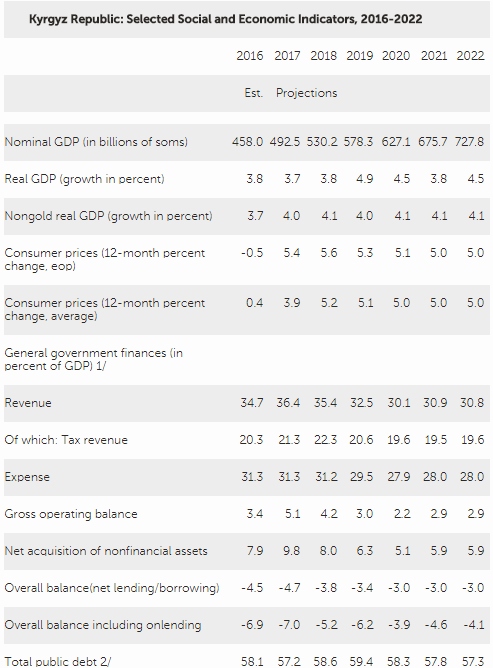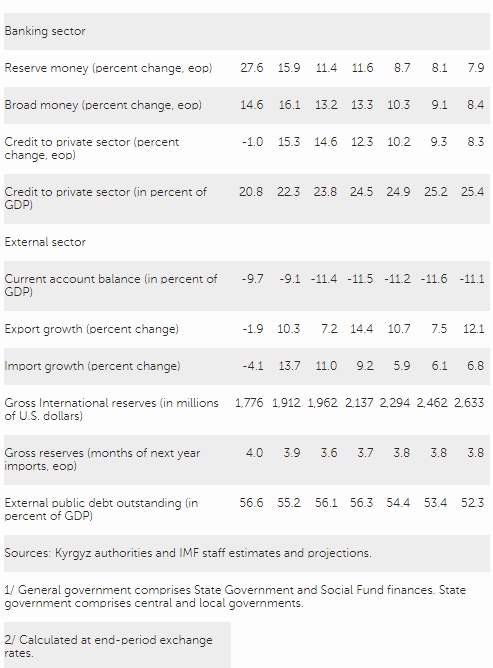IMF Executive Board Concludes 2017 Article IV Consultation with the Kyrgyz Republic
On October 20, 2017, the Executive Board of the International Monetary Fund (IMF) concluded the Article IV consultation with Kyrgyz Republic.
The Kyrgyz economy is slowly recovering from external shocks (lower oil prices, weaker regional environment). The recovery is supported by a pickup in partner-country growth and a flexible exchange regime. Inflation is starting to normalize, pushed by an increase in food prices, but remains below the central bank’s target range. The current account deficit is narrowing, helped by a rebound in exports and remittances.
In the run-up to the October 2017 Presidential elections, fiscal policy became looser. One-off expenditures are expected to burden the 2017 budget, while increases in wages, pensions, and benefits will mostly weigh on the 2018 budget. The National Bank of the Kyrgyz Republic continues to carry a neutral and cautious monetary policy stance with limited exchange rate interventions. The banking sector is showing signs of recovery with credit to the private sector increasing. Progress in structural reform has been slow.
Near- and medium-term prospects are improving as economies recover across the region, but realizing stronger medium-term outcomes necessitates prudent macro policies and structural reforms. Under a no-reform scenario, growth would remain well below the average achieved in the pre-global-financial-crisis period and the external position would weaken.
Executive Board Assessment
Executive Directors agreed with the thrust of the staff appraisal. They welcomed the broad economic recovery underway on the back of the improving regional economic situation and rising domestic and external demand. Directors noted, however, that significant challenges remain and called for prudent macroeconomic policies and structural reforms to make growth more diversified, sustainable, and inclusive. They encouraged continued efforts toward fiscal consolidation to bring debt on a downward path, strengthening the financial sector, and accelerating reforms to foster private sector development.
Directors noted with concern the sizable fiscal slippages in the run-up to the presidential elections. They emphasized the importance of continuing growth-friendly fiscal consolidation to ensure debt sustainability and to rebuild fiscal buffers. Directors emphasized that consolidation should be complemented by revenue mobilization efforts by introducing new permanent measures, broadening the tax base, and streamlining tax exemptions. At the same time, they also stressed the importance of improving public expenditure efficiency, particularly by reforming public sector wages, reducing energy subsidies, strengthening targeted social programs, implementing public financial management reforms, adopting a credible fiscal rule, and realizing the full benefits of the recently adopted procurement law.
Directors considered the current neutral monetary stance and exchange rate flexibility as appropriate and encouraged the National Bank of the Kyrgyz Republic (NBKR) to continue pursuing its key objective of maintaining price stability. They emphasized the importance of improving the monetary transmission mechanism and making a gradual transition to inflation targeting. Directors also encouraged the NBKR to limit intervention in the foreign exchange market only to mitigate for excessive volatility of the exchange rate.
Directors noted that vulnerabilities are still present in the banking sector. In this context, they welcomed the NBKR’s intention to move to risk-based supervision and to operationalize the crisis preparedness framework. They called on the swift enactment of amendments to the Banking Law to strengthen the governance and independence of the central bank. Regarding the narrowing of the correspondent banking channels, they stressed the importance of bringing the domestic legislative framework in line with international standards, including through prompt enactment of the draft AML/CFT law and a few Directors emphasized the importance of sustained global action to help resolve the issue. Directors highlighted the importance of ensuring a level playing field and equal treatment for all market players and supervised entities, and urged the NBKR to refrain from assuming equity positions in lending or investment entities.
Directors encouraged the authorities to accelerate structural reforms to unleash private-sector growth potential and to make economic development more inclusive. They emphasized the importance of shifting to a more diversified growth model, which will require bridging gaps in skills, capital, infrastructure, and productivity. Directors also underscored the need to improve the business climate and governance, and to continue fighting corruption. To fully reap the benefits of the Eurasian Economic Union membership, Directors pointed out that trade and competition policies should be developed to reduce non-tariff barriers and enhance competitiveness.


Source: International Monetary Fund
- 310 reads
Human Rights
Fostering a More Humane World: The 28th Eurasian Economic Summi

Conscience, Hope, and Action: Keys to Global Peace and Sustainability

Ringing FOWPAL’s Peace Bell for the World:Nobel Peace Prize Laureates’ Visions and Actions

Protecting the World’s Cultural Diversity for a Sustainable Future

Puppet Show I International Friendship Day 2020

